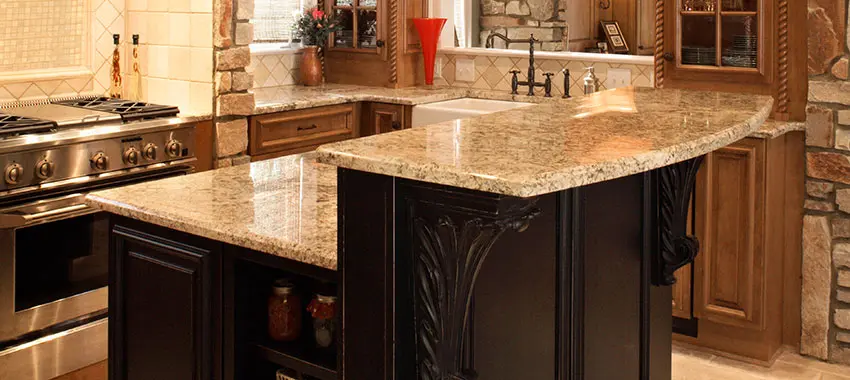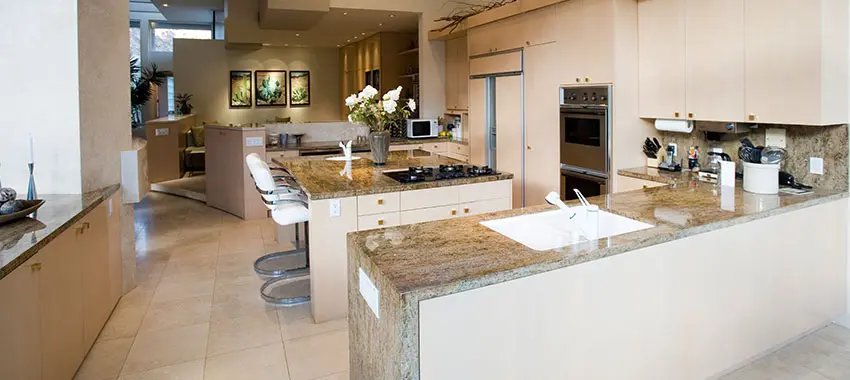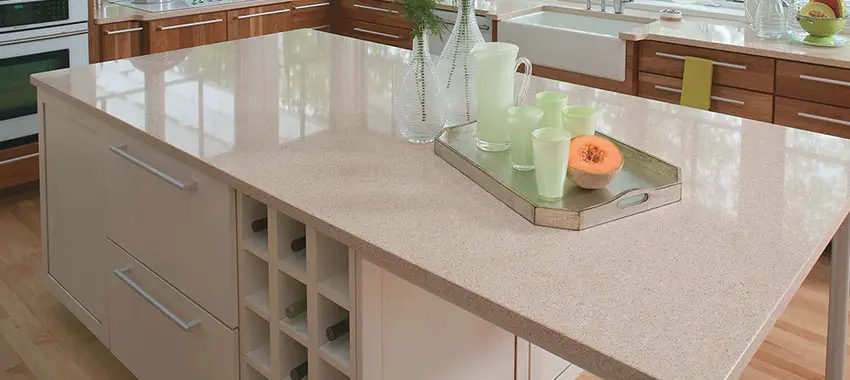Sep
Shattering Common Misconceptions About Granite Countertops
- 2023
- FlintStoneTops
Granite countertops are wonderful for the kitchen, but there are a couple of misconceptions and myths about them that could affect its reputation. We are here to shatter the misconceptions with facts so anyone who wants to choose granite countertops doesn’t have to fear the things that just aren’t true.
Misconception #1: Granite Is Unsafe
Unsanitary countertops are not appealing to anyone, but granite has had a misconception for a while now, that its surfaces are breeding grounds for bacteria and viruses. That’s far from the truth. While granite may be porous, it doesn’t house bacteria on its surface. If you seal the countertops, then this issue is long forgotten as well.
Regardless, granite and other durable stones are not going to contaminate your food and cause health issues in the future as long as you keep resealing the natural stone after every few years. It may be a hassle for some, but most people think that it’s worth it. If sealing is an issue, you can opt for quartz countertops that don’t require sealing.
Misconception #2: Granite Can Never Break
Durability is one of the key selling points of granite and it’s a very smart marketing tactic a lot of retailers use to get people to buy granite countertops. While granite is a strong material, it certainly doesn’t mean that it’s going to last forever.
Yes, it can last a good chunk of time, about 5 to 15 years, but there will come a point when the slabs are just too old and cracked that you’ll have no choice but to replace them eventually. This is true for most countertop materials.
Misconception #3: It’s Expensive
Granite, at first glance, can seem pretty expensive, and while that’s still a valid debate, there are a lot of other materials that exceed the price of granite. Considering that granite is reasonably durable and popular, it’s not as expensive as you think. Rather, it’s one of the cheaper options as far as natural stones are concerned.
Granite countertops are an investment but add to that the amazing durability and the fact that it increases the value of your property, it makes up for the cost.
Misconception #4: Granite Is Difficult To Maintain
This is considered to be one of the biggest disadvantages of buying granite countertops for your kitchen. People assume that they’ll need to slave over these countertops in the name of maintenance, but that’s not the case.
Yes, these countertops do need to be sealed and that’s non-negotiable, but that doesn’t imply that granite is high-maintenance. You can clean the surfaces with a regular countertop cleaner or even a soap and water solution and as for annual maintenance, resealing and polish is more than enough to make your countertops look beautiful and pristine for years. There’s not a lot to the maintenance of granite as people assume.
Misconception #5: Darker Granite Is More Durable
This is another huge misconception about granite and it’s debunked with the help of some chemistry.
Granite is usually available in lighter and darker colors and while darker-colored slabs are more popular, they’re certainly not the most durable, as they’re marketed to be. Rather, light-colored granite slabs contains a hard mineral, pulverized quartz, which is also a durable and amazing stone that imparts more strength to them.
So, the next time you’re out buying granite countertops, try to go for the lighter colors because they’re stronger.
Misconception #6: Granite Isn’t Shiny Forever
This might be true for stones like soapstone and marble, but granite won’t disappoint you in the shine department. Granite is naturally shiny and it rarely ever loses its sheen. If the countertops are getting too old, then there might be some sign of dullness, but that’s also reversible.
All you need to revive the shine of granite countertops is some clear varnish or polish. You can apply it on the surface of the countertops and the granite will appear better than before (but may be not exactly like new if the slab is too old). So, if you’re worried about granite losing its shine within a couple of months, then don’t be.
Misconception #7: Granite & Marble Are The Same
Granite and marble are sometimes marketed to be the exact same stone. That’s not true at all. Marble and granite are two completely different stones.
Granite is essentially an igneous rock that is formed by the cooling of molten magma under high pressure. This is what gives granite its dark color and characteristic veining. Marble, on the other hand, is limestone or calcium carbonate that’s deposited either in the sea or in moist areas and then they are hardened to form huge rock slabs.
So, in composition, it is clear that marble and granite are nothing alike except the fact that both are natural stones.
Misconception #8: Granite Stains Permanently
Granite doesn’t stain a lot either. A lot of the time, people are scared that granite can stain like no other stone, and it causes permanent stains, but that’s not the case at all. Yes, certain things can stain the surface of granite, but nothing is permanent as long as you are vigilant about cleaning the surfaces daily and every time you cook.
Cooking oil and fruits can lead to some of the peskiest stains on granite, but they’re not permanent, by any means. If you clean the countertops daily and reseal it after very few years, then there’s no chance of stains.
Misconception #9: Granite Emits Harmful Gasses
There have been rumors floating around that granite emits one of the most harmful gasses and that’s radon. Radon is a carcinogenic gas that is highly dangerous for human beings to even be around, but does the rumor hold any truth? Of course not!
EPA has done a lot of research in this regard, especially when the rumor first came to the surface and it was found out that granite cannot emit radon because there are no reactions taking place within the stone to prove this theory. Granite is a highly inert stone that doesn’t emit any sort of gas or harmful toxin, let alone radon.
Misconception #10: Granite Is Getting Less Popular
The choice of countertop material is different for everyone but it’s wrong to assume that one countertop is getting more popular than the other. This seems to be the case with quartz and granite, where people may argue that quartz has the upper hand.
Each material has a unique appearance and design and each of them serves different purposes. Granite is still a classic and popular choice for a lot of people and it’s a cult-favorite. It’s not going “out of trend” anytime soon, so it’s better to get rid of this misconception for good.
Misconception #11: Heat Damages Granite Countertops
Heat is considered to be the biggest enemy of most countertop materials, but does granite fall in the same category as well? We all know that heat stains are ugly and extremely unpleasant, but granite is considered to be one of those few materials that can withstand heat to a decent point.
One of the main advantages of granite being an igneous rock is the fact that it can endure high-temperature levels without getting damaged. However, you should still not put hot pots, pans, and utensils directly on the surface of your granite countertops because it can still stain the surface if the pot is too hot or left on the surface for too long.
Conclusion
These bite-sized facts are good to keep in the back of your mind for knowledge because you don’t want to get side-tracked by hearing irrelevant things about granite countertops. Once you decide that granite would be right for your kitchen, consult granite countertop installers Potomac.




